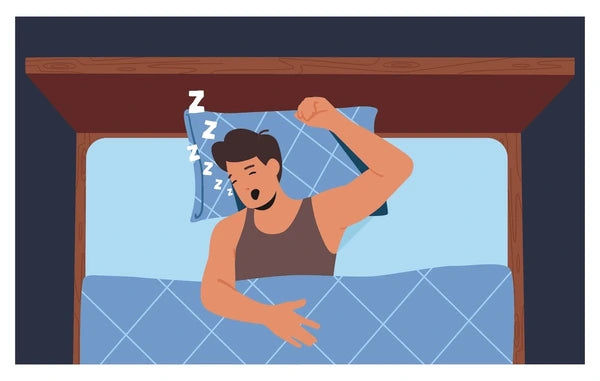Is Sleeping with Your Mouth Open Bad?
Introduction:
You might not think much about whether you sleep with your mouth open or closed, but this simple habit can have significant effects on your health. While it’s common for some people to sleep with their mouth open, especially when congested or due to certain sleep disorders, doing so regularly can lead to a range of issues, from poor oral health to disrupted sleep. This article will explore why sleeping with your mouth open can be problematic and how to address it.
1. The Causes of Mouth Breathing During Sleep:
Understanding why some people sleep with their mouths open.
- Nasal Congestion: Allergies, colds, or sinus infections can block the nasal passages, forcing you to breathe through your mouth.
- Sleep Apnea and Snoring: Sleep disorders like obstructive sleep apnea can lead to mouth breathing as the body struggles to get enough oxygen.
- Anatomical Issues: Deviated septum, enlarged tonsils, or nasal polyps can obstruct airflow, causing mouth breathing.
- Habitual Mouth Breathing: Some people develop the habit of breathing through their mouth during the day, which carries over into their sleep.
2. Health Risks of Sleeping with Your Mouth Open:
Why mouth breathing can be harmful to your overall health.
- Dry Mouth and Bad Breath: Breathing through your mouth dries out saliva, which is essential for washing away bacteria. This can lead to bad breath, tooth decay, and gum disease.
- Poor Oral Health: Dry mouth creates a more acidic environment, increasing the risk of cavities, tooth sensitivity, and oral infections.
- Reduced Sleep Quality: Mouth breathing is often linked with disrupted sleep due to snoring, restless sleep, and even sleep apnea.
- Impaired Oxygen Intake: Breathing through your nose filters and humidifies the air while promoting optimal oxygen exchange. Mouth breathing bypasses these benefits, leading to less efficient breathing.
3. Long-Term Effects of Chronic Mouth Breathing:
The potential consequences of long-term mouth breathing habits.
- Facial Development in Children: In children, chronic mouth breathing can affect facial structure, leading to elongated faces, dental issues, and speech difficulties.
- Increased Risk of Sleep Disorders: Regular mouth breathing can worsen conditions like sleep apnea, leading to fragmented sleep and daytime fatigue.
- Posture and Alignment Issues: Mouth breathing can affect head and neck posture, potentially leading to tension headaches and neck pain.
4. How to Prevent Mouth Breathing While Sleeping:
Practical tips to encourage nasal breathing during sleep.
- Address Nasal Congestion: Use saline sprays, humidifiers, or allergy treatments to keep nasal passages clear.
- Practice Nasal Breathing: Train yourself to breathe through your nose during the day to build this habit for sleep.
- Sleep Position Adjustment: Sleeping on your back or elevating your head can help reduce mouth breathing.
- Use a Mouth Tape or Chin Strap: Special mouth tapes or chin straps can gently keep your mouth closed, encouraging nasal breathing during sleep (consult a doctor before trying this).
- Seek Professional Help: If mouth breathing is due to sleep apnea or anatomical issues, consult with a healthcare provider or ENT specialist for proper diagnosis and treatment.
5. When to See a Doctor:
When mouth breathing could indicate a more serious underlying issue.
- Persistent Snoring or Sleep Apnea Symptoms: If you experience loud snoring, choking during sleep, or excessive daytime sleepiness, it’s time to see a sleep specialist.
- Chronic Nasal Blockage: If nasal congestion persists despite remedies, an ENT specialist may need to evaluate potential structural issues.
- Dental Issues: Frequent dry mouth, bad breath, or tooth decay might require intervention from both a dentist and a healthcare provider.
Conclusion:
Sleeping with your mouth open might seem harmless, but it can lead to various health issues, especially if it becomes a long-term habit. By addressing the underlying causes and encouraging nasal breathing, you can improve both your oral health and sleep quality. Simple adjustments and professional guidance can make a big difference in ensuring you breathe easier and sleep better.

